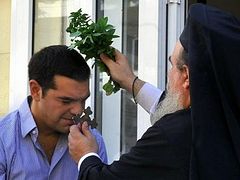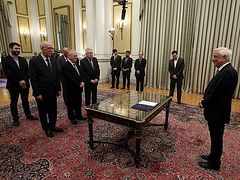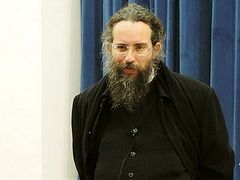Athens, November 7, 2018
Greek Prime Minister Alexis Tsipras and His Beatitude Archbishop Ieronymos of Athens and All Greece have come to an agreement on the conditions for the separation of Church and state in terms of constitutional reforms.
The Greek government recognizes that it paid an undervalued compensation for earlier-received Church property and now, instead of paying priests’ salary, it will pay a subsidy to the Church.
“The Joint Statement of the Greek Church and State,” received by RIA-Novosti from the Prime Minister’s press service, contains a preamble and 15 paragraphs.
The ruling radical left SYRIZA party introduced a draft amendment on October 2, calling for the “modernization” of article 3 of the constitution to reinforce the religious neutrality of the state while maintaining “for historical and practical reasons, the recognition of the Orthodox Church as the dominant religion.” Such changes are rather serious for a country where 98% of the population is Orthodox, although Tsipras assures that the agreement will not contradict the Greek people’s age-old traditions.
“The declaration of religious neutrality in the Greek constitution should emphasize that the Greek state is the guarantor of religious freedom for the Greek people and Greek citizens. Nothing more, nothing less,” the Prime Minster said.
Tsipras met with Abp. Ieronymos and members of the Greek Holy Synod to discuss the reforms yesterday.
“After a long-term, comprehensive, and frank dialogue between the state and Church, a dialogue that took place in an atmosphere of respect and understanding, we now have the opportunity to move to coordinated and mutually acceptable and mutually beneficial initiatives related to the regulation of our relationship,” the joint statement reads.
“Our goal is to define the framework for the settlement and resolution of the historical ambiguity and to strengthen the autonomy of the Greek Church against the Greek state, recognizing [the Church’s] contribution and historical role in [the state’s] birth and formation,” the statement explains.
The statement includes 15 points towards reaching an “historic agreement” that would take the form of legislative regulation.
First, the Greek state recognizes that until 1939 it had received Church property for a fee less than its worth, for which it had taken over the clergy salaries as compensation, according to the statement. However, in the future, clergy will not be considered civil servants and will not receive state payments. Meanwhile, the state will pay an annual subsidy to the Church.
The Church acknowledges that after this agreement, it will waive any further claims for the aforementioned Church properties, though both sides agreed to the creation of a fund for the use of Church property, with the fund’s obligations being shared equally between the Church and state.
However, this agreement is not automatically in force. As Reuters notes, the agreement must first be approved by the Cabinet, Parliament, and Church leaders—and they could have quite a fight on their hands. A group representing priests has said they will resist any attempt to remove them as civil servants.
“We will struggle to ensure the present status is maintained,” Father Georgios Sellis, head of the association of Greek priests said.
Follow us on Facebook!







